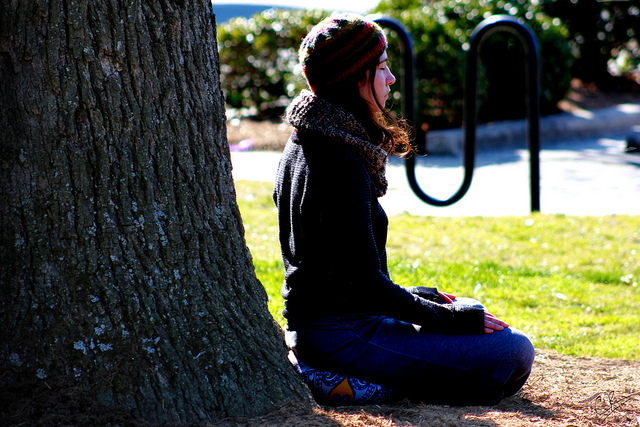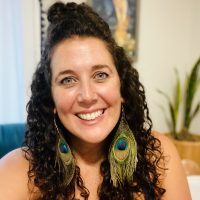When I was 15 years old, I started sensing the presence of dead people. Not really “people” I guess, but more “person.”
My uncle.
His death was sudden and unexpected, and the shock of it quaked through my teenaged body without mercy. My heart fractured in cruel, uneven breaks, and the residue of his passing would send jolts of stinging pain deep into my bones when I least expected it.
For years after his death I would curl up in an old t-shirt of his and cry deep, painful sobs. I tattooed an emblem of his life on my foot at 18, and throughout college I would gulp down Mickey’s beer, his favorite, in any attempt to feel the palpable hum of his presence against my skin.
He died a few weeks after Christmas and had stayed with us for the holiday. One day he called me into the bathroom with a hushed whisper as if he were about to bestow life lessons or forbidden secrets, and instead handed me a jar full of peppermint soap. I was admittedly confused, but he went on and on about how much he loved it and with a wink told me to make sure to tell my mom what it was so she didn’t think it was “piss or something” and throw it away.
I hugged the jar close to my chest and promised to treasure its contents. He was a wanderer, my uncle, often homeless or living in a tent by a river somewhere. He was by no means dirty, but the oddity of his gift struck me. A little luxury. I felt like I was peering straight into his soul.
I hadn’t yet used the soap when he died just weeks later, and I carried that jar with me from house to house and apartment to apartment throughout high school and college. It was a like a moving shrine, and I felt paralyzed to use it. Every now and then I would unscrew the jar, peel off the metal seal and allow the spicy scent to waft into my nose and transform into tears on my cheeks.
With that one tingling smell or one bitter pull of beer, I was transported right back into his presence. It wasn’t “like” he was there; he was there. And all the painful holes that were left in the wake of his death were immediately filled like the tide rushing back over the shore.
I didn’t talk about my connection with my uncle to anyone. Sure I shared my sad story freely, and the tattoo on my body always sparked questions. But for the first few years I didn’t tell them about the curious way I could hear him in my thoughts or the way I felt him standing next to my bed at night. Sometimes I quietly wondered if I was crazy, but mostly I just allowed it to be this special place where I could hide from the pain of what had happened.
For 15 years I nurtured and expanded this gift. I experimented with talking to others “over there,” and I began doing readings for people shuffling through these big questions about life and death and pain and joy. I waffled back and forth between thinking I was a complete fraud making this all up in my head and giving into the belief that it could be more than a sad girl’s way of coping with immeasurable amounts of grief.
When I gave birth to my daughter, the jagged edges of that death wound intensified. I had a drug-free, natural childbirth, and the experience was like getting hit with a semi-truck. It wasn’t ecstatic and sweet and empowering like all the birth documentaries described. It was traumatic and deflating and tortured, and I felt pushed to the edges of my humanity.
That place of mystical, transformative pain was ripped open again with ferocity, and I was shown how blurry the lines between life and death really are. Lao Tzu says, “Life and death are one thread, the same line viewed from different sides.” And suddenly I was looking down the opposite end of the thread realizing how connected it all is.
I had never experienced such tremendous amounts of physical pain, and everything about it felt so wrong. This was supposed to be a joyous celebration of new life, yet for hours I flailed in the same bleary depths I had nearly drowned in when facing my uncle’s death. It was like I was being water-boarded over and over and didn’t know how to surrender.
After it was over I remember lying in the bed at the birthing center holding my child against my naked breasts. My throat was raw from screaming, and my body was puffy from the fluids they had administered to keep me hydrated. And although my heart was swollen with a love I had never experienced before, I felt so numb that I remember thinking someone could push me out an airplane right then and I wouldn’t utter a sound.
I didn’t understand how I could feel both immense love and at the same time such intense despair. I felt abandoned by my uncle’s spirit, by the power that governed life and by myself. I felt consumed by the pain, swallowed whole and helpless to make any meaning of it.
The light didn’t begin to peek back in until almost a year later when I found meditation and the work of Dr. Joe Dispenza. For an hour, this man stood on a stage and clearly and lovingly told an audience of a thousand people that we didn’t have to live a life defined by our pain, and for some reason in that moment I was ready to believe that it didn’t have to hurt this bad anymore.
I dove headfirst into this practice of going within, and just as I had done when I was first learning to connect to my uncle, I began to quiet the loop of the story in my head and tap into an unseen presence outside the boundaries of my physical form. As I did this I somehow disembodied myself from the pain and was suddenly freed to look at it from a different vantage point.
I began to better understand how the pain was so important for the process of falling deeper into connection with myself. Through the act of making meaning of these events in my life, I gave myself a platform to speak from my experience, to validate my voice as worthy of being heard where once it had been shaky and unsure. It didn’t matter if what I was experiencing was right or wrong; it was mine.
As I unraveled my wounds, I began to realize that it wasn’t this black or white truth about what it was supposed to mean; it was up to me to find the meaning that opened me wide enough to finally take a breath. I was the secret ingredient, and that felt wildly empowering. I stopped looking outside to others for the answers and began looking inside myself.
When I gave myself permission to decide what it all meant, everything became clearer. I saw how my uncle’s death taught me about impermanence. How my devotion to his spirit taught me about mysticism. How believing in and growing my psychic gifts taught me about trusting myself. How my daughter’s birth taught me about honoring my own experiences.
I won’t sugar coat it by saying that everything happened for a reason or that it was the way it was supposed to be in some big divine plan. I would trade the lessons in a heartbeat to have my uncle back and to share a beer with him right now. And I wouldn’t wish those twenty-one hours of bone-shaking childbirth pains on my worst enemies. But if I’m being honest, the pain opened me in ways I’m not sure any other experience could have, and maybe it’s better that I don’t have the power to take it all back.
Pain is a powerful teacher. It rattles us in that primal place where we don’t have the luxury of lying to ourselves anymore. It grabs us by the umbilicus and shakes us from our open-eyed slumber slamming us head-on into ourselves. It is a commanding beast of an energy, and it’s a motherf*cker to face.
But it’s so very effective at making us see things in new ways.
I’ve made sense of the pain by sitting still and talking to dead people. By sharing mystical stories to alive people about the truth of who I am. By expanding into a clearer, stronger version of myself than I ever was before the pain woke me.
It doesn’t mean it doesn’t still hurt sometimes. It just means I’ve found a way to cope that expands me instead of contracts me. And if I know anything about life, it is that expansion feels a whole lot better.
Author: Kayla Floyd
Editor: Catherine Monkman
Image: Caleb Roenigk/Flickr
 Share on bsky
Share on bsky






Read 0 comments and reply